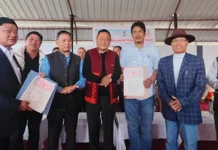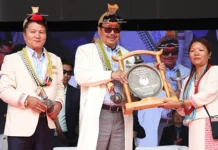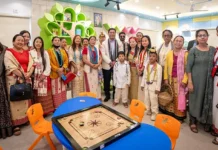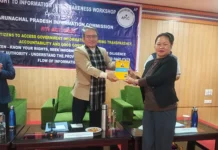Yobins reclaiming Vijaynagar
[ Taba Ajum ]
ITANAGAR, 18 Dec: As the situation in Vijaynagar in Changlang district returns slowly to normal in the wake of the burning down of several government properties a few days ago by an irate mob allegedly led by the All Yobin Students’ Union, seeking ouster of Gorkha settlers and in protest against the voting rights given to them, it is time to look back at history and try to comprehend the root cause of the problem.
This reporter spoke to senior members of both the Yobin and the Gorkha communities to obtain a historical perspective, and to understand what they feel should be the way forward.
The Yobin community, also known as Lisu, claims that they have been living in Vijaynagar, which is known as Dawodi in the local language, since time immemorial.
They see the non-APST settlers, mostly consisting of former soldiers of the Assam Rifles, as guests who have to leave the place someday.
On the other hand, the settlers, the majority of whom are from the Gorkha community, claim that they have sacrificed everything by settling down in an interior place like Vijaynagar, helping it to become part of the Indian territory, and therefore deserve all the rights.
This is where the problem starts.
As per the 2011 census, the population of the Yobins is 4,000, but it is expected to be around 5,000 now. The settlers’ population is believed to be around 2,500.
The Indian Army landed in Vijaynagar in 1961.
“The army wanted to know the source of the Nao Dihing river which flows through Miao. They carried out air expeditions till Chaukan Pass and saw smokes coming out of the settlement in Vijaynagar. After that, they started gathering information and one local Singpho named Pisila told them about the Yobins. He was the interpreter when the expedition happened,” said Yusihay Yobin, a native of Vijaynagar who is now working as a teacher in a private school.
The first expedition, known as the Chaukan pass expedition, took place in 1961. The civil administration was set up in 1962. The first settlement of non-APST started in 1967 and the process ended in 1971.
“In Chidudi village near Vijaynagar, the people refused to leave when the authorities asked them to vacate the area for the settlers. The authorities threatened them and a few buffaloes were gunned down by soldiers to scare the locals. A few of the witnesses are still alive. Imagine being chased away from your ancestral land,” said Yusihay.
He also said that the attempt by a few people to try to link the Yobins with the Lisus of Myanmar and China was disrespectful.
“Trying to link us with Myanmar and China where Lisu lives is unfortunate. There are many Arunachalee tribes whose members reside in Myanmar and China, but no one says anything about them. By virtue of demarcation we became part of India and we are proud Indians,” Yusihay said.
He said the Yobins always were in touch with the Singpho community, even before the army made inroads in their land.
“We have been in touch with the Singpho community since time immemorial. They addressed us as Yoyin, from which the Yobin word originated. Also, our people used to go upto Lido and Margherita to buy salt. This is how we remain connected with the rest of India,” said Yusihay.
He also made it clear that the Yobin community has no problem with the settlers and in fact have immense empathy, the way the government of India has abandoned them.
“It is wrong to say that we are against the settlers. We respect their contribution in nation-building and they deserve due respect. But we cannot part with our ancestral land where the spirits of our ancestors still reside,” added Yusihay.
He also claimed that in the past ST right of the Yobins was taken away under mysterious circumstances and because of it, many generations suffered for no fault of theirs.
“Many lost opportunities due to lack of ST certificates. Today there are only two people from the Yobin community working under the government of Arunachal. One is a junior teacher and the other an interpreter in the CO office. But we are thankful that ST status has now been restored,” Yusihay said.
He also said that for years the Yobin community kept silent in hopes that the settlers would leave once the lease agreement ends.
“The lease is ending this year. In the past, we always thought the settlers were government people and that one day they would leave. Even our elders used to warn us not to marry settlers, saying they would leave one day,” he said.
However, as the settlers’ population increases, they are occupying new places and this is where the root of the problem lies, Yusihay said.
“Government hurts our sentiments by trying to equate indigenous people like us with settlers who came to our region very recently,” he added. (To be continued in the next issue. This is the first of a two-part series. The version of the Gorkha settlers will be next.)




